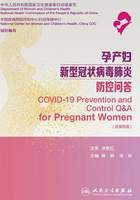
上QQ阅读APP看书,第一时间看更新
Management Chapter
Question 1: What are the specific policies and measures to strengthen the disease treatment and safe delivery for pregnant women during the epidemic?
National Health Commission issued the “ Notice on Strengthening the Disease Treatment and Safe Delivery for Pregnant Women during the COVID- 19 Period”,offering the following guidance to standardize the maternal care during the epidemic period.
(1) Actively guide pregnant women to follow the advice on personal protection and maternal care. Local obstetric institutions should strengthen the prevention and control of hospital infections, strengthen the health education, guidance and counselling to pregnant women,guide the pregnant women to reasonably arrange their antenatal care schedule, and make timely visits to the medical institutions for hospital delivery.
(2) Ensure sound management of the hospital visits of feverish pregnant women. Local obstetric institutions around the country should set up fever clinics whenever possible and disclose to the public the list of such institutions. The obstetric institutions should establish a pretesting and triage system under which the fever clinics should conduct screening for feverish pregnant women. For pregnant women screened to have suspected or confirmed infections, they should be referred to the designated hospitals as soon as possible. The obstetric institutions should implement the case management for high-risk pregnant women.
(3) Effectively ensure antenatal and safe delivery services for pregnant women with suspected and confirmed infections. According to the number of pregnant women and the technical resources for delivery service in the local jurisdiction, a group of obstetric institutions with strong comprehensive treatment capacity should be established as the designated hospitals for pregnant women during the epidemic period, which will give priority to the admission and treatment of pregnant women with suspected and confirmed infections. The designated hospitals for pregnant women should effectively provide antenatal and safe midwifery services for pregnant women with suspected and confirmed infections. The list of such hospitals should be announced to the public in a timely manner. At the same time, sound care should be provided to the infected pregnant women with critical conditions in the jurisdiction.
(4) Strengthen the intrapartum management for pregnant women with suspected and confirmed infections and the emergency care of newborns born to them.For the delivery of pregnant women with suspected or confirmed infections, the cooperation between the obstetric and paediatrics departments should be strengthened.For newborns born to pregnant women with suspected or confirmed infections, the neonatal department will provide tailored management for different categories of newborns evaluated to have various conditions; for those with severe clinical manifestations, they should be transferred to a designated hospital with strong neonatal emergency care capacity in a timely manner.
(5) Ensure sound maternal management. All local areas should try to protect the maternal and child safety by refining and implementing the relevant work plans and ensuring availability of medical resources. Health departments at all levels should fulfil their organization and coordination responsibility to put in place this requirement,through ensuring a smooth flow, sound information communication, and well-organized transfers among the obstetric institutions, designated institutions, and critical care centres. Maternal and child health institutions at all levels should ensure effective publicity and health education, information report, technical support, overall coordination, and jurisdiction management in accordance with their responsibilities.